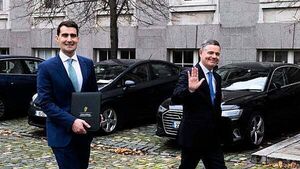Topline takeaways from Budget 2026

Michael McAleer
According to the budget speeches, Ireland's economy is holding steady in the face of global turbulence.
The Minister for Finance Paschal Donohoe said the economy will grow 3.3 per cent this year, with growth of 2.3 per cent predicted for 2026. With over 63,900 more people employed in Ireland than the same period last year, Mr Donohoe predicted another year of what's considered full employment.
Against this backdrop, the topline elements in Budget 2026 are:
- A 65c increase in the national minimum wage to €14.15 per hour.
- The price of a 60-litre tank of fuel will rise by €1.28 for petrol and €1.48 for diesel
- A packet of 20 cigarettes is increasing by 50c, with a pack now just under €19
- There will be a €10 across-the-board increase to core weekly welfare payments, including the old-age pension
- Child support payments will increase by €8 for kids under 12 and €16 for those aged 12 and over
- Eligibility for fuel allowance will be extended to those receiving working family payments
- Fees for students will come down by €500 on a permanent basis, to €2,500. This will be experienced by many as an increase in real terms, as they have been temporarily lowered to €2,000 in recent years
- Income thresholds for SUSI grants will rise by €5,000 to €120,000 per household
- VAT rate on hospitality cut to 9 per cent from July 2026
- VAT rate for completed apartments is cut to 9% from 13% until the end of 2030
- The renters' tax credit has been extended for three years at its current level of €1,000 for an individual or €2,000 for a couple
- Mortgage interest tax relief was extended for two years, but reduced for the final year. People will be able to claim the existing level of €1,250 for 2025, and €625 for 2026
- No changes to the broader personal taxation except for a rise in the USC 2 per cent rate band to €28,700
- The weekly fuel allowance rate will go up by €5 and has been extended to those eligible for the working family payment
- Reduced public transport fares will be maintained for next year
- Lower VAT of 9 per cent on utility bills will be extended for three years to the end of 2028
According to the Department of Finance, the number of people working in the public sector has increased by 66,500. This includes key frontline service areas such as the health, education and justice sectors.
Public Expenditure Minister Jack Chambers said the Government will provide for 1,717 additional special needs assistants to bring the number in the system to almost 24,900. Also, there will be an increase of 1,042 teacher posts, which includes 860 additional teachers working in special educational needs settings.
There will also be an increase in the standard capitation rates paid to schools from €224 to €274 for primary and special schools, and from €386 to €406 for post-primary schools.
He said the department’s allocation of €1.6 billion for capital investment will progress the delivery of more than 300 school building projects, which will deliver additional capacity for approximately 2,800 places for special classes and special schools.
The Department of Defence budget will increase by 11 per cent. Mr Chambers said this will provide for a “net increase” of 400 Defence Forces members, 50 new civilian jobs, as well as 70 civil servants to work in “critically important areas such as cyber security”. There is also an allocation to fund the “ongoing, necessary replenishment of ammunition stocks”, which means new bullets and shells. There will also be the roll-out of a new body armour system.
Health will get a final budget allocation of €27.3 billion next year, up €1.5 billion on 2025, with 300 more staff for mental health services.
At Justice, up to 1,000 additional gardaí are being deployed next year, with more money for resourcing immigration processing and programmes on youth diversion and tackling domestic violence.
A further €433 million is being given to complete the national broadband plan, he said, and €357 million for broadcasting, which includes €65.4 million for TG4.
Households with solar panels who in a position to sell electricity back to the grid may benefit from an extension of the income tax disregard of €400 for microgeneration. It is being extended until the end of 2028.
New League of Ireland football academies for young talent have been allocated €3 million, with more to come in future years. The GAA is in the budget as well, with €1.6 million in funding for inter-county players.
Finally, one of the quirkier items from the Budget 2026 is the income tax relief for makers of uillean pipes and Irish harps, which has been extended to the end of 2028, costing the Exchequer an estimated €500,000.



